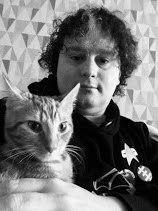Halloween Special Track of the Week: The Birthday Party: King Ink (1981)
'King Ink', like many Birthday Party songs, is a portrayal of a corrupt soul. The song starts off with just Tracey Pew's sinister bass line, sounding like something that crawled out of a swamp, and a continuous, slow, percussive thump. Nick Cave then introduces us to the bizarre eponymous character, a mess of depression, self-doubt, paranoia and mania. There is certainly a Kafka influence in the lyrics, with Cave telling us that 'King Ink feels like a bug / And he hates his rotten shell', an image that is frequently returned to throughout the song. The song is structured around Howard's guitar, which alternates between sparse dissonance, creaking like hinges on an old door and scraping like nails down a chalkboard, and the 'chorus', during which he plays a rickety and scratchy but quite catchy descending riff. The song's creepy atmosphere is accentuated every now and then by sudden and unexpected crack of the snare drum. But then the lyrics get more surreal. Cave manically implores King Ink to wake up, and the band freak out with him, guitar and drums getting faster and faster and more and more unhinged, until they wear themselves out, leaving just the unchanging bass line, over which Cave unleashes an unholy, blood-curdling scream worthy of Iggy Pop on 'Funhouse'. Pop music gets no more wild, sinister or deranged. But it isn't all doom and gloom - as the song winds to the end, bizarrely, we leave King Ink singing 'What a wonderful life' along with Fats Domino on the radio. For The Birthday Party, unlike many of the po-faced Goths who followed in their wake, had a sense of humour. They were a great band, but with the levels of intensity, mania and drug-taking being sky-high, it was never going to last forever. Nick Cave's ego got the better of him, and he split the band, taking Mick Harvey with him to forge a solo career that has produced much excellent music, oddly winding up as a respected singer-songwriter, some miles away from the anarchic punk he started out as. Roland S. Howard went on to solo projects and collaborations with Einsturzende Neubauten and Lydia Lunch, but tragically, Tracey Pew's excessive drink and drug intake lead to his early death as the band was splitting. As the post-punk revival trundles on, becoming more and more processed and safe, it is a shame there aren't more bands out there taking their cue from the passion and intensity of The Birthday Party.

